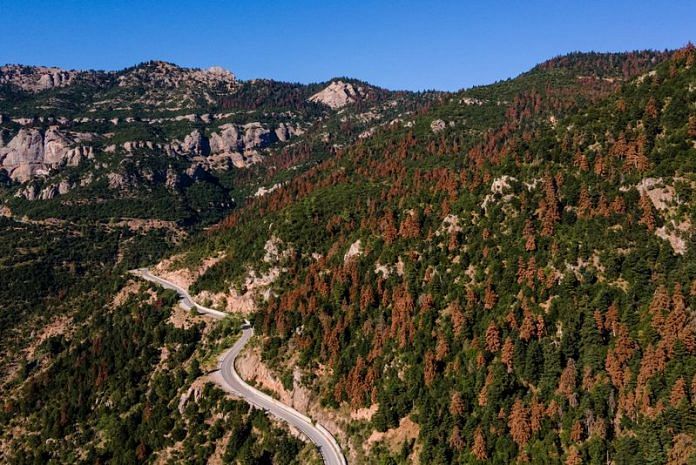By Vania Turner
KALAVRYTA, Greece (Reuters) -On the wooded slopes surrounding the village of Kalavryta in southwestern Greece, hundreds of dying fir trees stand out among the dark green foliage, their brittle, reddish needles a stark reminder of how drought slowly drains the life from nature.
Fir trees are known to need cooler, moist climates. But prolonged droughts in recent years linked to a fast-changing climate in Greece are leaving them exposed to pest infestations, scientists and locals said.
“In the past, we used to see a few dead trees scattered amongst the healthy ones,” said Katerina Kolirou, head of the local forest service in Kalavryta, a village famed for its forests of the Greek fir species Abies cephalonica.
“Now, unfortunately, among the dead ones, we try to spot the few remaining healthy green firs.”
Less water and moisture mean that fir trees become more vulnerable to attacks by pests that bore into their bark to lay eggs and create tunnels, disrupting the trees’ ability to transport nutrients between roots and branches and leading to their death.
“These are wood-boring beetles,” said Dimitrios Avtzis, a forest entomologist and research director at the Greek Agricultural Organization Demeter, a state research agency, as he cut into the bark of a decaying tree in Kalavryta and found a beetle that he later placed in a vial for examination.
“They don’t form populations as large as bark beetles, but they are just as destructive to the tree.”
Across the globe, 2024 was the warmest year on record, with the average temperature exceeding 1.5 degrees Celsius above the pre-industrial era for the first time.
Temperatures in Greece rose by the same amount between 1991-2020, but in some northwestern mountain areas there was a larger 2C increase, said director of research at the National Observatory of Athens Kostas Lagouvardos, who led a study on rising temperatures and snow cover.
This, in turn, reduced the number of days the soil was covered by snow, another vital source of moisture for fir trees.
He estimated a 30-40% snow-cover decrease over the years.
Fir forest decline, also seen on the Greek mainland and the Ionian Islands, is not unique to Greece. In the province of Huesca in Spain, also in the Mediterranean region, a different species of fir in the Pyrenees mountains, the Abies Alba, has also shown signs of declining in recent years, a development that scientists link to extreme heat.
In Kalavryta, authorities plan to remove dead and infested trees to limit the damage. But this might not be enough to save the forests.
“We cannot stop climate change,” Lagouvardos said. “What we can try to do is mitigate it or find solutions. But we cannot create snow.”
(Reporting by Vania Turner in Athens, additional reporting by David Latona in Madrid; Writing by Angeliki Koutantou; Editing by Alexandra Hudson)
Disclaimer: This report is auto generated from the Reuters news service. ThePrint holds no responsibility for its content.




